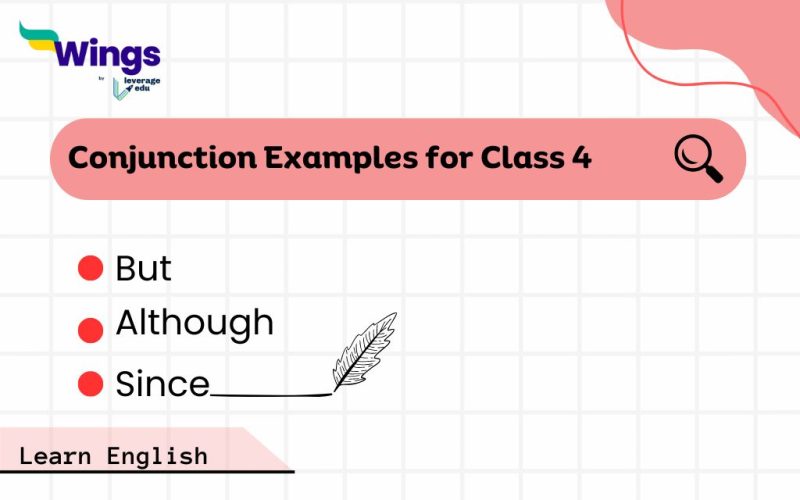Conjunction examples for class 4: Conjunctions are also known as joining words as they are used in connecting two sentences, phrases or clauses. This topic is vital in English grammar, especially for a student who is a grammar nazi and wants to better their sentence formation. Some of the commonly used words in conjunction include because, for, it, and, or nor, whether etc. In this blog, you will get to learn all about conjunctions and their examples which will help a grade 4 student understand this topic clearly.
This Blog Includes:
Different Types of Conjunction Examples for Class 4
As discussed above, conjunctions also known as connecting words are used to connect various phrases in a sentence. They act as an adhesive that ties sentences together. Conjunctions are of three types, these include coordinating conjunctions, subordinating conjunctions and correlative conjunctions. Let’s understand each conjunction with the help of the examples mentioned below.
Also Read: Types of Conjunction: Definition, Types, Examples, & Exercises PDF
Coordinating Conjunction Examples for Class 4
This type of conjunction is used in connecting words, phrases or clauses that have the same or comparable structure. Some of the most commonly used conjunctions which come under this category are but, or, for, so, nor etc. Take a look at the examples mentioned below to get a better understanding.
| 1. | For he was hungry, he decided to order a pizza. |
| 2. | She wanted to go to the concert, but she couldn’t find a ride. |
| 3. | He loves to swim, and he enjoys hiking. |
| 4. | I’ll meet you at the cafe, or we can meet at the park. |
| 5. | She studied hard, yet she still failed the exam. |
| 6. | They could not go to the beach, nor could they visit the museum due to the rain. |
Also Read: 55+ Coordinating Conjunction Examples (‘F.A.N.BOYS’) in English Grammar
Subordinating Conjunction Examples for Class 4
Subordinating conjunctions are used to connect two independent clauses to a dependent clause. Some of the commonly used subordinating conjunctions include although, if, because, when, while, since etc. Below are some examples of subordinating conjunctions which will help you understand their usage in a better way.
| 1. | Although it was raining, we decided to go for a walk. |
| 2. | Since it’s late, we should hurry up. |
| 3. | If you study hard, you’ll pass the exam. |
| 4. | She stayed home because she wasn’t feeling well. |
| 5. | He read a book while waiting for the bus. |
| 6. | I’ll call you when I arrive. |
Also Read: What is the Difference Between Independent and Dependent Clauses?
Examples of Correlative Conjunctions
This type of conjunction appears in pairs and is used in connecting related words, clauses or phrases. Some of the most common correlative conjunctions are either…or, neither…nor, both…and, not only…but also, and whether…or. Below are some examples of correlative conjunctions to get a better understanding.
| 1. | Both Sarah and John enjoy hiking. |
| 2. | Either we go to the beach or we stay home. |
| 3. | Neither the cat nor the dog wants to go outside. |
| 4. | Not only did she finish her project on time, but also she exceeded expectations. |
| 5. | Whether you like it or not, we have to leave soon. |
Also Read: Correlative Conjunctions Examples & Exercises (Download PDF)
Conjunctions Worksheet for Class 4
Time to test yourselves! To help you test your knowledge of conjunctions, we have compiled an exercise which will help you in testing yourselves.
FAQs
A conjunction is a word that is used to connect clauses, phrases and other words in a sentence. Many types of conjunctions are part of the English grammar. Some examples of conjunctions include but, and, because, for, it etc.
10 examples of conjunctions are and, so, because, for, it, though, although, moreover, therefore, as soon as, still etc.
Conjunctions are of 3 types, these include coordinating conjunctions, correlative and subordinating.
Related Reads on Conjunctions!
We hope this blog has provided you with all the necessary information on “conjunction examples for class 4.” To advance your grammar knowledge and read more informative blogs, check out our Learn English page and don’t forget to follow Leverage Edu.
 One app for all your study abroad needs
One app for all your study abroad needs














 45,000+ students realised their study abroad dream with us. Take the first step today.
45,000+ students realised their study abroad dream with us. Take the first step today.

